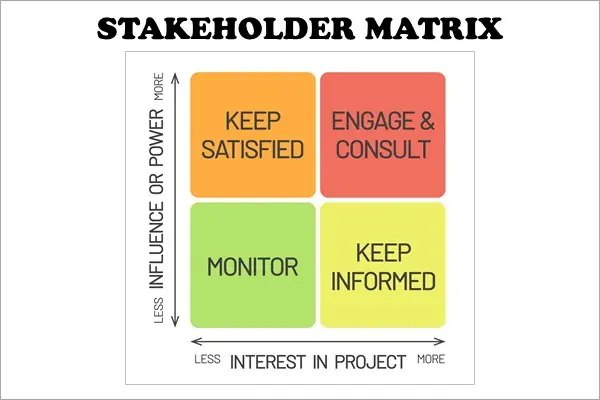How Stakeholder Engagement is becoming Important in India
 Share
Share
 Copy Url
Copy Url

Stakeholder engagement is a big deal in the business world. This article will discuss the importance of talking and listening to stakeholders - those affected by a company's actions. We'll also talk about the benefits of engaging with them. When companies listen to their stakeholders, their decision-making improves and everyone benefits. That's why it's part of things like ESG reports. These reports show how a company is doing in looking after the environment, being fair, and running things properly.
We'll also look at how to figure out who your stakeholders are and the best ways to connect with them. This is crucial for making sure businesses do the right thing, like caring for the environment and the community. That's what we mean by corporate social responsibility and sustainability. Check a company's annual reports, integrated reports, impact reports, and sustainability reports to gauge their performance in these areas. Effective stakeholder engagement leads to smarter, stakeholder-focused decisions by companies. Plus, we'll see how this is becoming more popular in India, leading to better ways of doing business.

Stakeholders and Stakeholder Engagement Explained
Who is a Stakeholder?
A stakeholder is any individual, group, or organization that can affect or be affected by the actions, objectives, and policies of a business or organization. Stakeholders have a vested interest in the company's activities and outcomes. Employees, customers, suppliers, investors, community members, and government bodies are key to a company's decision-making and strategies. Therefore, it's no secret that their needs and interests are crucial.
What is Stakeholder Engagement?
Stakeholder engagement refers to a company talking to and listening to its stakeholders. First, a business needs to identify who its stakeholders are. Then, it starts talking with them. These conversations help the company know what these stakeholders need and like. It leads to smarter, more sustainable choices by the company. When a business listens to its stakeholders, it does things that are good for everyone, not just itself. Remember, talking to stakeholders isn't a one-off. It's a continuous thing that helps the business and its stakeholders get along and work better together.
12 Types of Stakeholders You Should Know About
In the world of business, there are two main kinds of stakeholders: those inside the company (internal) and those outside it (external). Each group affects or gets affected by the business in different ways. Here's an overview of the different types of stakeholders:
1. Suppliers
These entities provide goods or services to the organization, playing a key role in the supply chain.
2. Owners
These can be individuals or groups who have a financial and strategic interest in the company.
3. Investors
People or entities who invest capital in the organization with the expectation of financial returns.
4. Creditors
These include banks and other financial institutions that lend money to the organization. Their primary interest is the repayment of loans with interest.
5. Communities
The local community where the organization operates, and is concerned with how the organization's actions affect their environment, economy, and quality of life.
6. Trade Unions
Represent the collective interests of workers, often focused on labor conditions, wages, and employee rights.
7. Employees
The workforce of the company, central to its operations, is interested in job security, fair treatment, and proper remuneration.
8. Government Agencies
Regulatory bodies that ensure the organization complies with laws and regulations, including tax, environmental, and labor laws.
9. Customers
They buy products or services from the organization and are interested in quality, price, and customer service.
10. Competitors
Other companies in the same industry or market that compete for the same customer base.
11. Media
They can influence public perception of the organization and are interested in reporting on its activities.
12. NGOs and Interest Groups
These organizations may be concerned with various aspects of the company's operations, such as environmental impact, social responsibility, and ethical conduct.
Understanding these different types of internal and external stakeholders is crucial for a business as they each play a unique role in influencing business decisions and outcomes. Effective stakeholder management involves recognizing these varied interests and finding ways to address them in the company's operations and strategy.

What are the Benefits of Stakeholder Engagement?
Stakeholder engagement is a key component in the success of a business. Let's explore some of the benefits that come from engaging with stakeholders.
Boost in Sales and Market Value
When a business interacts with its stakeholders, it often sees a boost in its sales and market value. This is because stakeholder engagement improves the company's reputation. A good reputation can lead to increased sales and higher share prices.
Better Decision-Making
Engaging with stakeholders provides valuable feedback. This feedback helps businesses make better decisions. It's important to consider what stakeholders think and feel. When companies include their viewpoints, they make clearer, more informed decisions.
Social License to Operate
For a business to thrive, it needs more than legal permission. It needs the trust and support of local communities. Regular and honest interaction with these communities earns a business the 'social license to operate'. This means the community supports the business and its operations.
Avoiding Conflicts
Regular talks with local communities can prevent misunderstandings and conflicts. By engaging with stakeholders and setting up ways to handle complaints, businesses can avoid disputes. This helps in running the business smoothly.
Corporate Social Responsibility
Stakeholder engagement is crucial for companies wanting to address global sustainability challenges. By choosing to focus on one or more of the UN Sustainable Development Goals (SDGs), companies can work alongside stakeholders to make a positive impact. This could include efforts in human rights, education, or other social causes.
Risk Management
Effective engagement with local communities and stakeholders is also key in managing risks. During the COVID-19 pandemic, companies with good stakeholder relationships managed risks better. They organized vaccination drives and other support activities. This helped society and also improved their financial results.
Enhancing Report Quality
Finally, stakeholder engagement is essential for creating impactful and comprehensive reports. Whether it's sustainability, annual, ESG, or impact reports, the participation of stakeholders enriches the content. It ensures that these reports reflect the true influence and operations of the company, regardless of its size.
As you can see, stakeholder engagement brings a multitude of benefits to a business. It boosts a company's reputation and helps it make better decisions. Another benefit is that it builds trust with communities, prevents conflicts, and supports responsible business practices. It also helps in managing risks and improving the quality of reports. Engaging with stakeholders is not a good practice; it's a key way for businesses to grow and have a positive impact on society.

Steps for Identifying Stakeholders
Identifying stakeholders is a key part of stakeholder engagement. It's like figuring out who should be at the table when making decisions. Here's how you can do it:
Step 1 - List All Possible Stakeholders
Start by listing everyone who might affect or be affected by your business. This includes both internal and external stakeholders.
Step 2 - Assess Their Influence and Interest
For each stakeholder, think about how much they can influence your project and how interested they are in it. This will give you insight into their potential impact.
Step 3 - Determine Their Needs and Concerns
Understand what each stakeholder needs and worries about. This helps you prioritize who to focus on and how to engage with them.
Step 4 - Categorize Stakeholders
Group your stakeholders based on their interests and influence. This helps you decide how to approach each group.
Step 5 - Develop Engagement Strategies with your Team
Plan specific ways to involve each stakeholder group. Think about the best methods to communicate and work with them.
Step 6 - Review and Update
Stakeholders can change over time. Keep your list and strategies up-to-date to make sure you're always engaging the right people.
To wrap up, identifying stakeholders is a crucial step to get you started with stakeholder engagement. It's about knowing who has a stake in your project, understanding their perspectives, and then involving them in a way that works for everyone. This way, you can make decisions that are informed, inclusive, and more likely to succeed.

Stakeholder Engagement in India: What’s Going On?
In India, stakeholder engagement is becoming a really important part of how businesses and the government make decisions. It's all about getting different groups and people involved. These are the folks who are impacted by what a company does or who can influence the company. They're not just there to talk; they actively help make decisions. This helps make changes that last and make a difference.
Now, businesses in India are focusing more on being responsible and including everyone in their plans. They're not just sharing ideas; they're listening to what stakeholders have to say and using that in their strategies. This includes understanding big issues in society and the environment that matter to people and finding ways to address them.
Who's involved in this? It's a big mix of people: local communities, companies, government agencies, NGOs, experts, and regular folks. It's especially important for businesses working on big projects to line up their engagement plans with their goals. They need to make sure everyone's on the same page and that there's trust.
A big part of stakeholder engagement in India is making sure stakeholders are involved from the start to the end of a project. This makes sure that the plans work well and help everyone. It's not a one-time thing. It's ongoing and helps businesses match what they do with what society needs. This way, they can keep being successful and helpful in the long run. Stakeholder engagement is changing in India. It's becoming more about having real conversations and finding solutions together. This is super important for navigating complex issues and making a big, positive impact.
Reasons Why Stakeholder Engagement in India is Gaining Importance
Long-Term Benefits
Engaging stakeholders in India is key for long-term success. This method leads to business and governance that are good for the company, community, and the environment.
Broad Scope
The scope of stakeholder engagement in India is wide and varied. It involves interacting with a range of stakeholders. These can be employees and customers or local communities and government bodies. Understanding the specific needs and concerns of these diverse groups is key.

Stakeholder Matrix Analysis
In India, organizations are now focusing on their stakeholder matrix. They are figuring out who their stakeholders are, how much they care, and the best ways to work with them.
Partnership Approach
There's an increasing trend towards partnership in stakeholder engagement. Businesses are working with stakeholders to solve common problems and reach shared goals. This helps them build stronger, more trusting relationships.
Mitigating Risks
Talking to stakeholders helps Indian businesses spot risks early and figure out how to handle them. This proactive approach helps in avoiding future conflicts and ensures smoother operations.
Important Role in Policy Making
Stakeholder engagement is becoming more important in making public policies in India. Involving different stakeholders ensures that these policies better represent everyone's views. In turn, they ultimately lead to better results.

Keeping the Lines of Communication Open with Stakeholders with Report Yak
In conclusion, stakeholder engagement in India is evolving as a vital tool for businesses and governance. It's about involving different people and groups in the decision-making process, which ultimately benefits everyone involved. Effective stakeholder engagement leads to smarter, more sustainable decisions that are good for the company, the community, and the environment.
Organizations must generate detailed reports as a way to maintain open communication during stakeholder engagement. This is where Report Yak, known for its expertise in report design, comes into play. With experience in creating a wide range of reports, from annual to ESG and sustainability reports, Report Yak ensures that your stakeholder communication is not only comprehensive but also visually engaging. These reports can significantly aid in ensuring that all parties are informed and involved. We invite you to read our full article for more insight into the importance of stakeholder engagement in India. Additionally, explore our portfolio and services at Report Yak to see if our expertise aligns with your reporting needs.
Get in touch over email - contact@reportyak.com or call us at 1800 121 5955 (India). We're here to help!
Related Posts
-
Integrated Reporting Made Easy For Modern Companies
annual reportAnnual Report design
+6
Dec 31, 2025Share
Copy Url
Simplifying ESG Disclosure for Better Impact
corporate reportingenvironmental and social initiatives
+6
Aug 28, 2025Share
Copy Url
GRI Sustainability Taxonomy: Learn How to Turn Data Into Advantage
corporate governancecorporate reporting
+11
Jul 1, 2025Share
Copy Url


